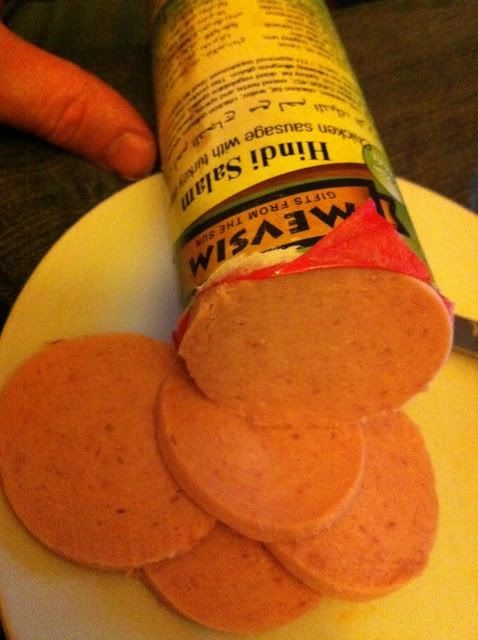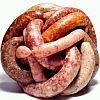Chicken?
35 posts
• Page 2 of 3 • 1, 2, 3
Hi,
As far as I am concerned, I must agree with Phil and Grisell about making these chicken salami's.
I am too old now to experiment with my health as you all probably have seen about my posts inquiring about using Cure # 1.
Enjoy your chicken, boiled, sauteed or roasted. At least there is a possibility that you won't be attending the loo too much or kick the famous bucket.
I have been too close to the last one several times since I was 20 years old.
Regards,
Jan. Brisbane.
As far as I am concerned, I must agree with Phil and Grisell about making these chicken salami's.
I am too old now to experiment with my health as you all probably have seen about my posts inquiring about using Cure # 1.
Enjoy your chicken, boiled, sauteed or roasted. At least there is a possibility that you won't be attending the loo too much or kick the famous bucket.
I have been too close to the last one several times since I was 20 years old.
Regards,
Jan. Brisbane.
- crustyo44
- Registered Member
- Posts: 640
- Joined: Thu Oct 07, 2010 12:00 am
- Location: Brisbane.Australia
wheels wrote:You don't give up, do you. It's like having a Jack Russell dog humping my leg!
I don't see the quote that you attribute to me repeated in Big Onion's post?
Andre, in any case, we've moved on from there, as you should know if you read the intervening posts. Whether those links I posted are dried sausage or not is irrelevant.
We know that experts in dried sausage making say it can be done.
The fact that you don't like that is of no consequence. I too wouldn't want to make a chicken salami, but the OP is quite capable of assessing the information and making his own decision.
Phil
Here is the link you posted http://www.recipetips.com/glossary-term ... salami.asp . That's the same product and it is undoubtedly cooked. Please show me one that is clearly unccoked and available commercially and I will take it back. If an uncooked turkey or chicken salami were safe, it would be on the market since there are millions of people that don't eat pork but would like a substitute for salami and prosciutto. There is "turkey ham", "turkey bacon", "turkey hot dogs" etc, but I have never ever seen air-dried turkey or chicken products on the market. I know a lot of muslims. None of them has ever heard about it.
How about food safety? The fact that 5,000 people die in the US every year from food diseases makes that question highly relevant in my opinion. Would you consider experimenting with raw chicken less dangerous than mixing your own cure to the right percentage (I'm refering to a subject where I personally was accused of misleading newcomers). Or is it because that was me? I have to ask since lately I've got the impression that whatever I write, you Phil, seem obliged to complain.
André
I have a simple taste - I'm always satisfied with the best.
I have a simple taste - I'm always satisfied with the best.
- grisell
- Registered Member
- Posts: 3171
- Joined: Sun Oct 04, 2009 6:17 pm
- Location: Stockholm, Sweden
wheels wrote:You don't give up, do you. It's like having a Jack Russell dog humping my leg!
[---]
Phil
http://forum.sausagemaking.org/viewtopic.php?t=4107 Please read section 4 from the top.
André
I have a simple taste - I'm always satisfied with the best.
I have a simple taste - I'm always satisfied with the best.
- grisell
- Registered Member
- Posts: 3171
- Joined: Sun Oct 04, 2009 6:17 pm
- Location: Stockholm, Sweden
There is another thing that makes this matter serious. If you make a salami with too much nitrite or a salami with botulism, only the ones that have eaten from it (hopefully only you in this case) will get sick.
Campylobacter and Salmonella, on the other hand, are contagious diseases that can affect many other people. They can be life-threatening to infants, older people and immunosuppressed people. Are you willing to risk other peoples' health and lives to satisfy your curiousity?
Campylobacter and Salmonella, on the other hand, are contagious diseases that can affect many other people. They can be life-threatening to infants, older people and immunosuppressed people. Are you willing to risk other peoples' health and lives to satisfy your curiousity?
André
I have a simple taste - I'm always satisfied with the best.
I have a simple taste - I'm always satisfied with the best.
- grisell
- Registered Member
- Posts: 3171
- Joined: Sun Oct 04, 2009 6:17 pm
- Location: Stockholm, Sweden
Here is something my local corner shop sells:


I'm pretty sure this is a cooked salami though. A glance at the ingredients list made me feel a bit queasy but just for you guys I 'took one for the team' and tried a slice. .....YEEUUUCCCHHHH!
 . It tastes as bad as it looks. A bit like supermarkets own brand SPAM.
. It tastes as bad as it looks. A bit like supermarkets own brand SPAM.
Anyhoo, if the Marianskis make it and it is common in certain countries then I'm quite sure it is possible to make one at home. Just be sure that your work station is spotless and that you know the provenance and freshness of your chicken/turkey. I certainly wouldn't make it with supermarket chicken but if I had chickens of my own then I'd certainly consider it. After all, cured duck breast is common. I've even made it myself without using cure.
I wonder if the reason we don't see any raw chicken salami in the EU is because of our very strict food safety legislation. I'm not saying I don't agree with the legislation, it just seems that there would be quite a big market for such a product.
All the best
Ryan
ps. You guys owe me £2.50. That chicken sausage was horrible


I'm pretty sure this is a cooked salami though. A glance at the ingredients list made me feel a bit queasy but just for you guys I 'took one for the team' and tried a slice. .....YEEUUUCCCHHHH!
Anyhoo, if the Marianskis make it and it is common in certain countries then I'm quite sure it is possible to make one at home. Just be sure that your work station is spotless and that you know the provenance and freshness of your chicken/turkey. I certainly wouldn't make it with supermarket chicken but if I had chickens of my own then I'd certainly consider it. After all, cured duck breast is common. I've even made it myself without using cure.
I wonder if the reason we don't see any raw chicken salami in the EU is because of our very strict food safety legislation. I'm not saying I don't agree with the legislation, it just seems that there would be quite a big market for such a product.
All the best
Ryan
ps. You guys owe me £2.50. That chicken sausage was horrible
- Ryan C
- Registered Member
- Posts: 218
- Joined: Tue Jun 08, 2010 12:11 pm
- Location: Kingdom of Fife
grisell wrote:There is another thing that makes this matter serious. If you make a salami with too much nitrite or a salami with botulism, only the ones that have eaten from it (hopefully only you in this case) will get sick.
Campylobacter and Salmonella, on the other hand, are contagious diseases that can affect many other people. They can be life-threatening to infants, older people and immunosuppressed people. Are you willing to risk other peoples' health and lives to satisfy your curiousity?
FOR SCIENCE! (more or less ...)
A lot goes on in our house that could potentially get someone sick. We feed our dogs and cats on a raw diet, and pretty frequently are found grinding 80 lbs of chicken necks, hacking into a deer vertebrae with an electric saw, grinding pounds of hearts and organ meat. On a nightly basis I need to feed them this food, so I'm constantly getting my hands in piles of raw meat. Ever had your hands in a bag of green tripe? That smell doesn't go away for days, and I can't imagine what nastiness is in that.
I think a lot of food sickness is caused by poor handling of the food. We clean like crazy people all the time because of what we do in our house. I laugh every time I see Alton Brown on Good Eats talk about "cross contamination" because that's just impossible for us to avoid.
I don't doubt that one could get sick, but someone could get sick from anything that's been poorly handled. Isn't that why we use things like curing salts, and safe handling methods, to make the things we make out of raw meats? Isn't there always a risk of E. coli in beef? Or just because it's been studied ad nauseum we can ignore that risk?
I really think that chicken has a bad reputation from past experiences, and the fact that not much is really out there is only because no one is doing anything in fear of those past experiences. If the chicken comes from a reputable source and has been properly handled from bird to freezer, I don't see how it could be any less safe than commercially processed ground beef. Campylobacter and Salmonella, from what I understand, thrive in the feces of a lot of animals (not just chickens). I assume that the contamination comes from the quick processing/gutting of the bird and some of the intestinal contents coming into contact with the meat. If I'm buying from a farmer who might do this by hand, or if I do it myself by hand, as long as he didn't rub the meat in a pile of chicken feces I think it should be okay, but just to be safe ...
I just found this link here:
http://www.meathaccp.wisc.edu/validatio ... vation.pdf
There's a list of pH values that certain forms of bacteria can survive in. If I'm reading this correctly, would ensuring a pH of less than 3.8 make it more safe against salmonella? I think most fermented sausages are usually at a pH of around 5.8, so that seems like a huge difference.
http://www.wedlinydomowe.com/sausage-ty ... ed-sausage
This one here talks about a pH of 4.8 and a Aw (water activity level) of 0.93 to resist Salmonella.
I don't know a whole lot about pH in curing meats, other than what I've read on the forums here, mostly, so maybe someone else can chime in. I think we can agree that we all know the risks, so maybe we can try and think of some ways to reduce those risks using our combined knowledge and information we have available to us.
Otherwise we can read articles like this and just stop buying raw chicken altogether:
http://www.telegraph.co.uk/foodanddrink ... finds.html
And if that's the case, I'll just put on my tinfoil hat and stay indoors since I hear those radio waves in the air might cause brain damage. Or something.
EDIT: Google "torisashi". Seems some Japanese chefs will serve this, but only from chickens that they raised themselves. Interesting.
Big Onion
http://www.mronionsneighborhood.com/
http://www.mronionsneighborhood.com/
- big_onion
- Registered Member
- Posts: 66
- Joined: Tue Mar 01, 2011 9:07 pm
- Location: New Orleans, LA
Grisell, I apologise that I didn't express myself as well as I could have and for my choice of words. FWIW, the page I linked to contains details for 2 products USDA #07266 Turkey salami and #07267 Turkey salami cotto. I don't think that it's unreasonable to assume that the first one is uncooked given that the company have gone to the trouble of pointing out that the second one is. The company has a very odd labelling policy if that's not the case. For all I know they may both be cooked, but that's irrelevant to most of us now as the discussion has moved on from that.
Your posts on the topic seem to me to have all failed to answer the original question - Can it be done? That's why I have to keep answering your posts.
The fact is that Stan and Adam Marianski, acknowledged experts in this field, say it can and even publish a recipe for it.
I'll leave forum members to judge for themselves who knows best: The Marianski's or Grisell.
Phil
Your posts on the topic seem to me to have all failed to answer the original question - Can it be done? That's why I have to keep answering your posts.
The fact is that Stan and Adam Marianski, acknowledged experts in this field, say it can and even publish a recipe for it.
I'll leave forum members to judge for themselves who knows best: The Marianski's or Grisell.
Phil
-

wheels - Global Moderator
- Posts: 12894
- Joined: Sat Sep 02, 2006 4:29 pm
- Location: Leicestershire, UK
- captain wassname
- Registered Member
- Posts: 1529
- Joined: Mon Sep 22, 2008 4:32 pm
- Location: west cumbria
BriCan wrote:I have if you like production recipes for the following:- chicken wieners, chicken bologna, chicken salami semy dry cured, possibly others if I look
I'd definitely like to see the recipe for the chicken salami, if possible.
Thanks!
Big Onion
http://www.mronionsneighborhood.com/
http://www.mronionsneighborhood.com/
- big_onion
- Registered Member
- Posts: 66
- Joined: Tue Mar 01, 2011 9:07 pm
- Location: New Orleans, LA
It would seem from a quick google that salmonella is quite common in pork.Dont know too much about different strains
Jim
Jim
- captain wassname
- Registered Member
- Posts: 1529
- Joined: Mon Sep 22, 2008 4:32 pm
- Location: west cumbria
It would seem from a quick google that salmonella is quite common in pork.Dont know too much about different strains
Jim
Jim
- captain wassname
- Registered Member
- Posts: 1529
- Joined: Mon Sep 22, 2008 4:32 pm
- Location: west cumbria
big_onion
Have you access to "The Art of making Fermented Sausages" by the Marianski's? Whilst I can put the ingredients etc here, it's the accompanying text and table that are the essential bits. To reproduce them here would almost certainly breach copyright.
Phil
Have you access to "The Art of making Fermented Sausages" by the Marianski's? Whilst I can put the ingredients etc here, it's the accompanying text and table that are the essential bits. To reproduce them here would almost certainly breach copyright.
Phil
-

wheels - Global Moderator
- Posts: 12894
- Joined: Sat Sep 02, 2006 4:29 pm
- Location: Leicestershire, UK
wheels wrote:big_onion
Have you access to "The Art of making Fermented Sausages" by the Marianski's? Whilst I can put the ingredients etc here, it's the accompanying text and table that are the essential bits. To reproduce them here would almost certainly breach copyright.
Phil
Oh man, please don't do that. Definitely don't need any legal problems!
Is it a book worth owning? I don't actually own any books on meat curing or sausage making, so it'd probably be good for me to start building a collection!
Big Onion
http://www.mronionsneighborhood.com/
http://www.mronionsneighborhood.com/
- big_onion
- Registered Member
- Posts: 66
- Joined: Tue Mar 01, 2011 9:07 pm
- Location: New Orleans, LA
35 posts
• Page 2 of 3 • 1, 2, 3
Return to Recipes for cured meats
Who is online
Users browsing this forum: No registered users and 10 guests


